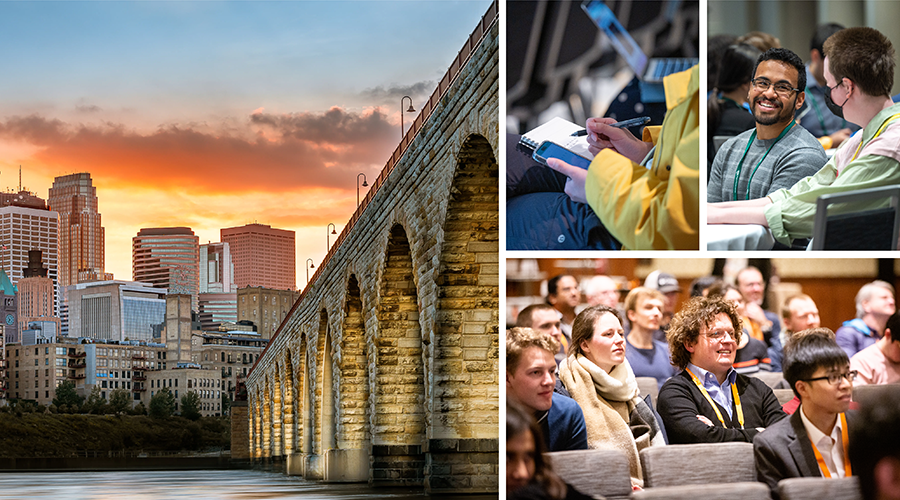As APS heads to Minneapolis, physicists can engage in person, online, or at a satellite event abroad.
By Liz Boatman | January 11, 2024

Credit: American Physical Society
If you’ve visited Minneapolis, you might know March is the best month for an authentic “city of lakes” experience — as long as you bring ice skates, or an ice auger and a fishing pole. This year, Minneapolis will welcome APS March Meeting 2024 attendees to the city’s convention center from March 3-8. A virtual program will run at the same time.
APS expects 13,000 attendees at the March Meeting in-person and online, surpassing attendance at last year’s event, the world’s largest physics gathering in 2023.
And 2024 is a big year for another reason: It’s APS’s 125th anniversary. Meeting Chair Paul Chaikin, a physics professor at New York University, is excited to mark the occasion with meeting attendees, as well as to celebrate the “important discoveries of the past century” and “new fundamental understanding” in the field, he says.
In addition to five days of hundreds of scientific talks spanning the discipline, tailored programming will be offered for students and early career physicists. Meeting highlights include:
Career sessions: Future of Physics Days events will include a grad school fair and workshops on effective networking and job searches, with special meeting grants available for undergrads (apply by Jan 16). This year’s Industry Day events include sessions ranging from how to found start-ups to careers in data science. Networking events will also give students a chance to connect with industrial and applied physicists.
Special sessions: Some events will be live-streamed for virtual participants, like the special session featuring Nobel laureates on Sunday, March 3. Pierre Agostini and Ferenc Krausz, two of the three 2023 laureates in physics, as well as one of last year’s chemistry winners, Moungi Bawendi, will address attendees. And on Thursday, March 7, the Kavli symposium looks toward the 21st-century challenge of ‘Physics Far From Equilibrium’, with a speaker lineup that includes Denis Bartolo, Niktra Fakhri, Mikhail Lukin, Chiara Mingarelli, and David Weitz. Their research spans from biophysics to quantum computing. (And there might be chocolate involved.)
Events for the public: Several APS units are teaming up to offer an all-ages Squishy Science Sunday event at the Minneapolis Convention Center, open to the public. Volunteers will deliver hands-on experiments and science demos that explore the world of biophysics, polymers, soft matter, and statistical physics.
Global satellites: Building off last year’s successful satellite meetings, Chaikin expects APS will see even greater participation by international members at synchronous events around the world. Meetings will be held, at a minimum, in Jordan, Pakistan, Brazil, Hong Kong, and Nepal.
Virtual March Meeting: Chaikin also points out that this year’s virtual March Meeting has been reimagined, thanks to feedback from APS members. One major change: The virtual meeting will run at the same time as the in-person event. Live presentations and virtual poster sessions will allow for real-time interaction, with in-person and virtual recorded presentations available for all attendees for 90 days after the meeting.
Whether you’re a biophysicist, cosmologist, or quantum physicist, if you’re planning to participate in March Meeting 2024, Chaikin extends a “warm” welcome — and a reminder to bring a winter coat if you’ll be joining in Minneapolis!
Liz Boatman is a science writer based in Minnesota.
Additional resources:
In-person attendees have an array of hotel options. Special rates with the meeting’s official hotel block end Feb. 9.
APS has compiled resources for international attendees. Attendees from less-resourced countries may qualify for discounted registration prices through the Society’s accessible pricing structure.
Attendees can see whether they’re eligible to apply for travel grants.
Attendees are encouraged to review APS’s code of conduct to help create a professional and welcoming space for all.
©1995 - 2024, AMERICAN PHYSICAL SOCIETY
APS encourages the redistribution of the materials included in this newspaper provided that attribution to the source is noted and the materials are not truncated or changed.
Editor: Taryn MacKinney
February 2024 (Volume 33, Number 1)
Articles in this Issue

